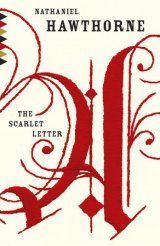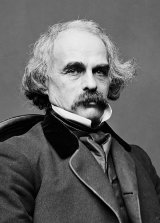The Scarlet Letter Page #7
First published in 1850, The Scarlet Letter is Nathaniel Hawthorne's masterpiece and one of the greatest American novels. Its themes of sin, guilt, and redemption, woven through a story of adultery in the early days of the Massachusetts Colony, are revealed with remarkable psychological penetration and understanding of the human heart.
It contributes greatly towards a man's moral and intellectual health to be brought into habits of companionship with individuals unlike himself, who care little for his pursuits, and whose sphere and abilities he must go out of himself to appreciate. The accidents of my life have often afforded me this advantage, but never with more fulness and variety than during my continuance in office. There was one man, especially, the observation of whose character gave me a new idea of talent. His gifts were emphatically those of a man of business; prompt, acute, clear-minded; with an eye that saw through all perplexities, and a faculty of arrangement that made them vanish as by the waving of an enchanter's wand. Bred up from boyhood in the Custom-House, it was his proper field of activity; and the many intricacies of business, so harassing to the interloper, presented themselves before him with the regularity of a perfectly comprehended system. In my contemplation, he stood as the ideal of his class. He was, indeed, the Custom-House in himself; or, at all events, the mainspring that kept its variously revolving wheels in motion; for, in an institution like this, where its officers are appointed to subserve their own profit and convenience, and seldom with a leading reference to their fitness for the duty to be performed, they must perforce seek elsewhere the dexterity which is not in them. Thus, by an inevitable necessity, as a magnet attracts steel-filings, so did our man of business draw to himself the difficulties which everybody met with. With an easy condescension, and kind forbearance towards our stupidity--which, to his order of mind, must have seemed little short of crime--would he forth-with, by the merest touch of his finger, make the incomprehensible as clear as daylight. The merchants valued him not less than we, his esoteric friends. His integrity was perfect; it was a law of nature with him, rather than a choice or a principle; nor can it be otherwise than the main condition of an intellect so remarkably clear and accurate as his to be honest and regular in the administration of affairs. A stain on his conscience, as to anything that came within the range of his vocation, would trouble such a man very much in the same way, though to a far greater degree, than an error in the balance of an account, or an ink-blot on the fair page of a book of record. Here, in a word--and it is a rare instance in my life--I had met with a person thoroughly adapted to the situation which he held. Such were some of the people with whom I now found myself connected. I took it in good part, at the hands of Providence, that I was thrown into a position so little akin to my past habits; and set myself seriously to gather from it whatever profit was to be had. After my fellowship of toil and impracticable schemes with the dreamy brethren of Brook Farm; after living for three years within the subtle influence of an intellect like Emerson's; after those wild, free days on the Assabeth, indulging fantastic speculations, beside our fire of fallen boughs, with Ellery Channing; after talking with Thoreau about pine-trees and Indian relics in his hermitage at Walden; after growing fastidious by sympathy with the classic refinement of Hillard's culture; after becoming imbued with poetic sentiment at Longfellow's hearthstone--it was time, at length, that I should exercise other faculties of my nature, and nourish myself with food for which I had hitherto had little appetite. Even the old Inspector was desirable, as a change of diet, to a man who had known Alcott. I looked upon it as an evidence, in some measure, of a system naturally well balanced, and lacking no essential part of a thorough organization, that, with such associates to remember, I could mingle at once with men of altogether different qualities, and never murmur at the change. Literature, its exertions and objects, were now of little moment in my regard. I cared not at this period for books; they were apart from me. Nature--except it were human nature--the nature that is developed in earth and sky, was, in one sense, hidden from me; and all the imaginative delight wherewith it had been spiritualized passed away out of my mind. A gift, a faculty, if it had not been departed, was suspended and inanimate within me. There would have been something sad, unutterably dreary, in all this, had I not been conscious that it lay at my own option to recall whatever was valuable in the past. It might be true, indeed, that this was a life which could not, with impunity, be lived too long; else, it might make me permanently other than I had been, without transforming me into any shape which it would be worth my while to take. But I never considered it as other than a transitory life. There was always a prophetic instinct, a low whisper in my ear, that within no long period, and whenever a new change of custom should be essential to my good, change would come. Meanwhile, there I was, a Surveyor of the Revenue and, so far as I have been able to understand, as good a Surveyor as need be. A man of thought, fancy, and sensibility (had he ten times the Surveyor's proportion of those qualities), may, at any time, be a man of affairs, if he will only choose to give himself the trouble. My fellow-officers, and the merchants and sea-captains with whom my official duties brought me into any manner of connection, viewed me in no other light, and probably knew me in no other character. None of them, I presume, had ever read a page of my inditing, or would have cared a fig the more for me if they had read them all; nor would it have mended the matter, in the least, had those same unprofitable pages been written with a pen like that of Burns or of Chaucer, each of whom was a Custom-House officer in his day, as well as I. It is a good lesson--though it may often be a hard one--for a man who has dreamed of literary fame, and of making for himself a rank among the world's dignitaries by such means, to step aside out of the narrow circle in which his claims are recognized and to find how utterly devoid of significance, beyond that circle, is all that he achieves, and all he aims at. I know not that I especially needed the lesson, either in the way of warning or rebuke; but at any rate, I learned it thoroughly: nor, it gives me pleasure to reflect, did the truth, as it came home to my perception, ever cost me a pang, or require to be thrown off in a sigh. In the way of literary talk, it is true, the Naval Officer--an excellent fellow, who came into the office with me, and went out only a little later--would often engage me in a discussion about one or the other of his favourite topics, Napoleon or Shakespeare. The Collector's junior clerk, too a young gentleman who, it was whispered occasionally covered a sheet of Uncle Sam's letter paper with what (at the distance of a few yards) looked very much like poetry--used now and then to speak to me of books, as matters with which I might possibly be conversant. This was my all of lettered intercourse; and it was quite sufficient for my necessities.
Translation
Translate and read this book in other languages:
Select another language:
- - Select -
- 简体中文 (Chinese - Simplified)
- 繁體中文 (Chinese - Traditional)
- Español (Spanish)
- Esperanto (Esperanto)
- 日本語 (Japanese)
- Português (Portuguese)
- Deutsch (German)
- العربية (Arabic)
- Français (French)
- Русский (Russian)
- ಕನ್ನಡ (Kannada)
- 한국어 (Korean)
- עברית (Hebrew)
- Gaeilge (Irish)
- Українська (Ukrainian)
- اردو (Urdu)
- Magyar (Hungarian)
- मानक हिन्दी (Hindi)
- Indonesia (Indonesian)
- Italiano (Italian)
- தமிழ் (Tamil)
- Türkçe (Turkish)
- తెలుగు (Telugu)
- ภาษาไทย (Thai)
- Tiếng Việt (Vietnamese)
- Čeština (Czech)
- Polski (Polish)
- Bahasa Indonesia (Indonesian)
- Românește (Romanian)
- Nederlands (Dutch)
- Ελληνικά (Greek)
- Latinum (Latin)
- Svenska (Swedish)
- Dansk (Danish)
- Suomi (Finnish)
- فارسی (Persian)
- ייִדיש (Yiddish)
- հայերեն (Armenian)
- Norsk (Norwegian)
- English (English)
Citation
Use the citation below to add this book to your bibliography:
Style:MLAChicagoAPA
"The Scarlet Letter Books." Literature.com. STANDS4 LLC, 2024. Web. 24 Nov. 2024. <https://www.literature.com/book/the_scarlet_letter_160>.




Discuss this The Scarlet Letter book with the community:
Report Comment
We're doing our best to make sure our content is useful, accurate and safe.
If by any chance you spot an inappropriate comment while navigating through our website please use this form to let us know, and we'll take care of it shortly.
Attachment
You need to be logged in to favorite.
Log In